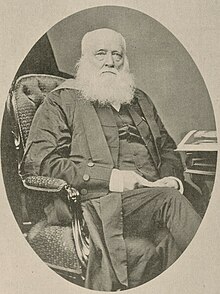John Rolph | |
|---|---|
 Rolph, c. 1870 | |
| Member of the Legislative Assembly of the Province of Canada for Norfolk County | |
| In office October 1851 – November 1857 | |
| Preceded by | Henry John Boulton |
| Succeeded by | Walker Powell |
| Member of the Legislative Assembly of Upper Canada for Norfolk County | |
| In office 20 June 1836 – January 1838 Serving with David Duncombe | |
| Preceded by | Francis Leigh Walsh |
| Succeeded by | William Salmon |
| Member of the Executive Council of Upper Canada | |
| In office 20 February 1836 – 12 March 1836 | |
| Toronto Alderman for St. Patrick's Ward | |
| In office 1834 | |
| Member of the Legislative Assembly of Upper Canada for Middlesex County | |
| In office July 1824 – 8 September 1830 Serving with John Matthews | |
| Personal details | |
| Born | 4 March 1793 Thornbury, Gloucestershire, England |
| Died | 19 October 1870 (aged 77) Mitchell, Ontario, Canada |
| Nationality | Canadian |
| Spouses |
|
| Children | 4 |
| Alma mater | |
| Profession | Physician, lawyer |
John Rolph (4 March 1793 – 19 October 1870) was a Canadian physician, lawyer, and political figure. As a politician, he was considered the leader of the Reform faction in the 1820s and helped plan the Upper Canada Rebellion. As a doctor, he founded several medical schools and incorporated new teaching techniques and medical procedures into his lectures. However, his actions against rival medical schools decreased public confidence in the ability of medical professionals to regulate themselves.
Rolph grew up in England and was educated in medicine and law. He immigrated to Upper Canada in 1813 and lived on his father's farm in Port Talbot, where he practiced law and medicine concurrently and opened a medical school called the Talbot Dispensary. In 1824, Rolph was elected to the Parliament of Upper Canada and returned to England to petition the Colonial Office to allow the naturalization of American citizens in Canada. He was elected as an alderman to Toronto's first city council, though he resigned after his council colleagues did not select him to be the city's mayor.
William Lyon Mackenzie persuaded Rolph to support the Upper Canada Rebellion in 1837. When the rebellion began, Rolph did not join the rebels at their headquarters and the Lieutenant Governor appointed him as his emissary to deliver the government's offer of a truce. Rolph fled to the US after the rebellion and focused on practising and teaching medicine. The Canadian government granted him amnesty and he returned to Canada in 1843, later creating a new medical institution called the Rolph School in Toronto. In 1851 he was elected to the Legislative Assembly of the Province of Canada and focused on his political career; upon the formation of the Morin-MacNab administration three years later, Rolph's priority returned to running his school. He retired as dean of his medical school in 1870 and died later that year after suffering a stroke.
